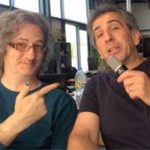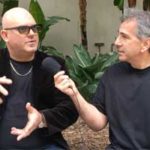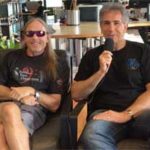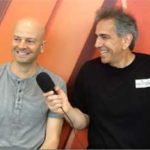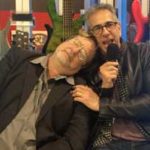Reformed accordionist, celebrates three decades of guitar god-dom
By Gary Graff
May 6, 2016
Thirty years ago Steve Vai was known in players circles as an up-and-coming guitarist, a Berklee College of Music hotshot who took lessons from fellow New York State native Joe Satriani and was tapped by Frank Zappa first as a transcriptionist and then as a guitarist in Zappa’s touring band.
But it was his mid-80s tenure as David Lee Roth’s guitarist on his first two solo albums, Eat ‘Em and Smile and Skyscraper, that made Vai a bona fide guitar hero, a new rock virtuoso with plenty of shred cred but also a rep for melodic, tasteful and adventurous playing.
Vai ignited his solo career in earnest with 1990’s Passion and Warfare, and the years since have seen him also do duty in Whitesnake, host G3 guitar package tours with Satriani, log time with Dweezil Zappa’s Zappa Plays Zappa live show and guest on albums by Ozzy Osbourne, Alice Cooper, Motorhead, the Yardbirds, Dream Theater, Meat Loaf, Spinal Tap, Joe Jackson and many others—winning three Grammy Awards in the process.
This year Vai is heading a new concept, Generation Axe, leading a quintet of fellow guitar heroes (Zakk Wylde of Black Label Society, Yngwie Malmsteen, Nuno Bettencourt (Extreme/Rihanna) and Animals As Leaders’ Tosin Abasi) on instrumental adventures around the country. And, he promises, there’s more where that came from.
FGPO: What first turned you on to the guitar?
Vai: I think it varies what people enjoy about the guitar. For myself it’s just the infinite potential or the creative potential of the instrument. The guitar is the most dynamic and expressive instrument in the world—that’s my feeling. There’s something about the clang of strings vibrating together that I think resonates in your soul. And they’re just cool instruments. Just look at it; It just looks so cool, the way it’s shaped and everything. It’s a little bit phallic, sure, and maybe people are subliminally attracted to that. (laughs) That’s not such a bad thing, is it?
FGPO: It’s certainly something that dominates musical culture.
Vai: I think so, yeah. You’ll always have people who have attractions to piano, saxophones, orchestra instruments. But guitar is the most accessible; within a few hours virtually anybody can be playing a simple song on it.
FGPO: It was not your first instrument, though, was it?
Vai: No, that’s right. I came from an Italian family, grew up on Long Island, so of course I played the accordion. (laughs.) There were things I really liked about it; it made music and I could play “Smoke On the Water” on it, and I had a songbook with all these standards which I kinda liked. What I didn’t like about it—’cause at the time I was like 9, 10, 11 years old—I just wanted to go out with my friends, and I didn’t want to spend time practicing, so I wasn’t very good.
It was funny, because my father—being the great Italian that he was—forced me to practice, and whenever you’re a kid you don’t take to authority very well. So there was a resistance there. And then when I was 12 and decided to play the guitar, I locked myself in my room for 10 hours a day, and he got worried about that—’Why are you practicing so much?!’” (laughs)
FGPO: It’s an auspicious year for you, the 30th anniversary of David Lee Roth’s Eat ‘Em and Smile album, which really put you on the map. What’s your perspective about that album three decades later?
Vai: I love the way it stands up, y’know? When I think about making it and being invited to be part of that fold and to tour, there was nothing like it. It was an absolutely incredibly rich life experience to be part of that whole thing. And when I listen to that record now I hear that 25-year-old Steve Vai, and I just see the fearless, visceral attitude, and it’s really fun and refreshing. I played my ass off on that record.
FGPO: Were you intimidated by the specter of Van Halen?
Vai: I was really bold, ’cause I knew that people would hear Dave’s voice and they’d be expecting to hear the guitar of Eddie Van Halen, and there was no way I was going to try to emulate Ed because: a) you can’t and b) I prefer the way I would do it. I just did my best, and when I look back I’m like, “Boy, you had balls, Vai.” And it stands up. People comment to me about it all the time.
FGPO: You guys tried to play again last fall in Los Angeles, but the club got so crowded the fire marshal called it off. Any plans to try it again?
Vai: I think so, yeah. When we got backstage after they pulled the plug on us, the feeling was “This would’ve been pretty cool. Let’s see if we can kind of make it up somehow.” We briefly brushed on the idea we had something great going there, and it’s worthy of maybe a little sort of reunion tour.
So there was good vibes about that, but the stars really have to align. You’ve got to get everybody and their mad schedules to be able to create an opening for something like that. It’s always been sort of on the table but there hasn’t been enough momentum to make it happen quite yet. But, with this last little almost gig, I think there’s more of a momentum. Nothing’s planned right now, but we’re certainly feeling it would be nice.
FGPO: You launched Generation Axe this year. How did that come about?
Vai: It was an idea, sort of a fantasy I’d kicked around since I was a teenager ’cause I was a huge fan of Brian May of Queen. Brian is just the master of layering guitars into these beautiful harmonies that are just to die for. I always thought, “How would it be to have a stage with five guitar players playing in harmony on those beautiful classic rock songs? The idea sat on a shelf for decades… and I received a call from Miles Copeland, who was looking to put together a guitar festival of sorts. I gave him this idea, and we thought it was great, so we partnered up and I made a list of the various genres—rock, metal, jazz fusion, acoustic—and then I wrote all of my favorite guitar players within those categories, and the first one we were able to put together was this kind of metal/hard rock package. It took awhile to get everybody’s schedules together, but it came out just great.
FGPO: Was there any apprehension among the five of you in tackling classics like “Highway Star” and “Frankenstein” or any of the other songs you’re doing?
Vai: When we got into rehearsals everybody had a big question mark over their heads; “How’s this gonna work? Once we started, that question mark turned into a light bulb. It was like, “Whoa! We get it!” It’s turning out just fantastic. It’s so cool to hear all these harmonies and people coming in and out, supporting each other, and there’s plenty of solo space. The ham is cookin’, brotha… (laughs)
FGPO: Do you foresee Generation Axe as a going concern, then?
Vai: I hope so. The feeling is obviously that if it goes well, which it has, we’d love to do more, and we will. The good thing about this is it can be genre specific. maybe it can be a different genre. I can get guys like Eric Johnson, Steve Lukather, Robben Ford, Al Di Meola, all different guys who use very different brain muscles, but still very applicable to this concept. So we’ll see. Right now I’m just digging this thing we’re doing now.
FGPO: What else are you up to now?
Vai: I just finished remastering Passion and Warfare for a 25th anniversary release; it’ll be packaged with a new record, Modern Primitive. If anybody is familiar with my first solo record Flex-Able, which was a very quirky kind of esoteric, playful record, and then Passion and Warfare came out six years later and it sounded like two different guys made those records. Through that whole period, I had about six recordings that were half-done, maybe 100 songs that I’d written but never recorded. So I took some of the songs I’d never recorded and re-recorded them and finished some of them ones from way back, and now I have this record that’s really the missing link between Flex-Able and Passion and Warfare, like cro-magnon Vai.
It’s another one of those moments where you look back at your youthful innocence and say, “My God, I had such balls.” You don’t have any expectations, you just do what you want as wildly as you want to for the fun of it.
FGPO: So what kind of perspective do you glean from that spelunking?
Vai: It’s an eye-opening, a little awakening into who you were, and it’s refreshing. As you go through life, there’s a tendency to get conditioned into what trends are, what you read in the press, what people start expecting from you. It can cut to the root of your ability to be infinitely free in your creative expression, so it’s good to reconnect to that kind of wild abandon you started with.
FGPO: Does that, in turn, embolden you as you start to consider new music?
Vai: Absolutely. I’m at a point in my life now… I’m 55, I’ve been through it all. I was never in it to make a name for myself, in a sense; I was just in it to express fun musical ideas. But if your cachet starts to grow, it’s not hard to create an image in your own mind for yourself, and then you start to follow that image and some ingredients in that image are the expectations of others—you as a guitar god, you have to do a certain thing.
For better or worse, things like that infiltrated my work. There’s a perspective that’s been firmly put in place for myself by the public that are interested in me, so you get to a point where what else are you gonna do? So going back and listening to that other music and feeling that freedom is inspiring. It does inspire your future work. It had a big effect on me, so I can’t wait to see what comes out of it.

